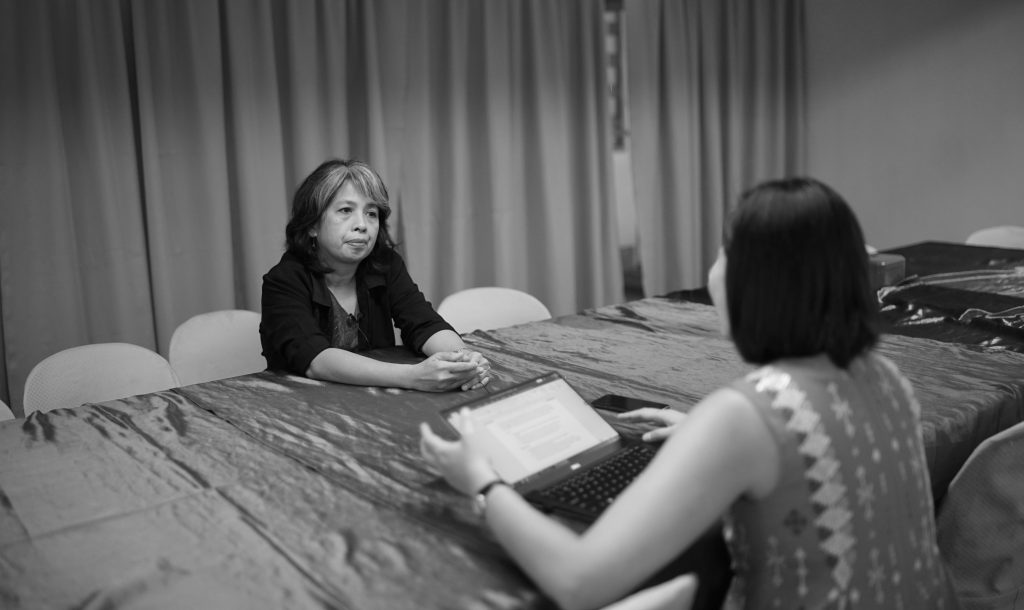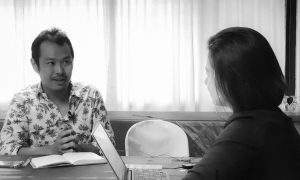In the penultimate episode of our second series of Philippines beyond clichés, Associate Professor Dr Nicole Curato of University Canberra’s Centre for Deliberative Democracy and Global Governance takes a look at a topic very close to her heart, when she talks to Dr Teresa Melgar about participatory governance. While the practice attract cynicism in many quarters, Dr Melgar’s comparative sociological research in Porto Alegre in Brazil and Naga in the Philippines has helped to understand how local democracy unfolds in post-authoritarian settings, and the role that institutionalising participatory processes can play in this. You’ll find the transcript for this episode below.
Nicole Curato [NC]: So, hi, Tere! Thanks for joining us!
Teresa Melgar [TM]: Hi, Nicole. Nice to see you again!
NC: Yes, so I think maybe we could set the context in the broader global context. I have a feeling, especially with the work that I do, I have a feeling that participatory processes have been in fashion in post-authoritarian settings. Is this impression, first of all, correct?
TM: I would say so. The need, the claim, or the wanting of participatory governance became really more pronounce in post-authoritarian era largely and perhaps this would also be your follow up question, largely because it turned out after these authoritarian regimes were brought down that the institutions that came to light were wanting a lot of ways. So representative democracies, representative institutions turned out to be increasingly populated also by older traditional elites and so citizens who were mobilised, who had high hopes about the transitions to democracy found themselves largely frustrated again by the lack of voice, by the lack of representation in these institutions. So, I would say so, the timing is a very important variable of important matter here in understanding rise of demands for the rise of participatory governance.
NC: But simply put, what is participatory governance? What makes it participatory and quite distinct from representative institutions?
TM: I think participatory governance places a lot of emphasis on direct participation, on citizens—particularly those who happen to be affected by specific problems or issues being discussed—have a direct role, substantive voice in assessing those issues and in coming up with potential solutions to them as well. That’s quite different from representative democracy because in representative democracy, we tend to rely on our representatives to articulate our grievances and our interests and potential aspirations or solutions as well. In participatory governance, there is an aspiration to share in the decision-making process by those who have traditionally been excluded from these processes. So, it’s a claim, again, also to recognition, that we are not just spectators, we are not just the ones affected but precisely because we are also the ones affected, then we need to have some substantive voice in these kinds of decision-making processes. That’s how participatory governance, I would say, would be different from representative democracy or representative governance. Nonetheless, it does not mean that it wants to do away with all sorts of representation. Advocates of participatory governance typically seek these new institutional arrangements that’s more participatory as a complement, as a way to strengthen, I would say, also our institutions as a way to strengthen and to expand more venues for the articulation of these kinds of grievances and interests. So, it’s complementary, nonetheless, it has a particular distinction that in a way also supports or improves on representative democracies.
NC: And do I have the right interpretation that the complementarity of representative and participatory institutions is very much enshrined in the 1986 Constitution of the Philippines? Because it really, it places big emphasis on people’s participation and voices of ordinary citizens. Can you walk us through that kind of ideal of participatory governance in the Philippines? And obviously, how that ideal is realized or not realized in practice.
TM: Well, I would agree with you that when the 1986 Constitution was ratified, that constitution, in fact, has been called as one of the most progressive in the world. There is a lot of support and recognition for human rights, at the same time people’s participation is also incorporated in a lot of the provisions. In fact, that’s recognised in some of the articles that people have the right to participate in governance. But of course, constitutions are largely statements of aspirations. In that sense, they embody goals and aspirations but what is needed is a way to put these aspirations into practice. And so, in the early 90s, a move to implement some of the provisions came to light such as the decentralisation provision, it was embodied in the Local Government Code. Of course, that Local Government Code roots itself into some of these constitutional provisions. But the Local Government Code became more specific that the Constitution, which is a good thing because it really insisted that citizens should be given spaces. There are even provisions concerning certain marginalised sectors in certain localities to be given actual representation in local governments. So the Local Government Code in that case made more specific some of the aspirations in the 1986 Philippine Constitution. And it was precisely because of the spaces that were opened up by the Code, meaning to say it’s a legal provision, governments have to abide by them, it was precisely this recognition of the power of the Local Government Code that citizens’ movements were mobilised in the transition to democracy saw that as a really promising arena in which to further articulate, further realise some of their advocacies, especially with respect to better governance at the local level. So, there’s a certain continuity but at the same time, it would not have happened, I would say, it would not have become more real if citizens did not realise those very promising spaces that were opened up by these institutional changes over time.
NC: Can you give an example or a favourite example in your study of citizens maximising that new space in a post-authoritarian context?
TM: Well, okay. One of the cases I studied was Naga. Naga is rather well-known in the Philippine context as you might say a hub, a site of really improved better governance. Much of the reforms there was attributed, of course, to the rise of reformers at the local level, the late Jesse Robredo. But at the same time, what needs to also be emphasised in this story is that a number of those participatory spaces came to light also because of the insistence of citizens’ movements in Naga, many of whom were mobilised in the anti-dictatorship struggle to indeed insist that those spaces be fully utilised in the search fro better solutions to their housing problem. Naga has a huge population of informal settlers who have been occupying largely private or public land and so informal settlers, the lack of housing is a huge problem and so one of the things that they did there was to insist that they have some participation in some local councils that are—these are local government councils, by the way—-that are searching for more promising solutions to the housing problem.
So, I would say that’s one. The other one would be, there was this coalition that came about in the post ’86 era, it’s called the People’s Council. This Naga City People’s Council (NCPC), that’s the full name, this actually has its roots to some of the discussions in the pre-1986 era and they were already thinking of what are the ways by which you can really realise citizens’ empowerment in a democratic setting. And when that democratic setting came about, they saw that again as an opportunity precisely to embody, to deeply embody the notion of having a citizens’ voice in these governmental spaces so that decision-making is no longer just monopolised by government. Progressive or enlightened as it may be but government has a lot to learn also from citizens, particularly those who are affected by certain problems because they are likely themselves also searching for solutions. And states do not have a monopoly in this case. When I say states, I mean specifically the reformers in government. They do not necessarily have a monopoly of visions or a monopoly of abilities to look for promising solutions. Rather, most of the time people found in these difficult situations would have also some ideas by which those problems can be solved.
NC: And is Naga the exception or the rule? Because I can already imagine a lot of critics saying that yeah, participatory processes are just a hoax, it’s a talk shop, it can easily be corrupted. So, for example NGO representatives working with, let’s say, local mayors are I don’t know, brothers-in-law or sisters-in-law, there’s a nepotistic element to it. So, there are many ways in which it can be corrupted. So, do you think it’s a defensible project in the context of the Philippines?
TM: Well, most democratic or democratisation projects are faced with a lot of challenges. And Naga happens to just have had in place certain contributory elements. And for that matter, a way of thinking about the success of Naga is to focus on some of these elements. You have reformers in power, you had a vibrant civil society that was also thinking of the maximisation of democratic spaces. You also had a decentralisation process happening at the time that they were thinking about this alternative institutional arrangements. So, it’s a combination of factors that really went well for Naga.
Now, can these things be rolled back? Can they be corrupted, in that sense? I would say certainly, those are some of the possibilities because we will also need to remember that even if we are able to make advances in participatory governance, they are not necessarily starting from scratch. Settings, democratic as they may be, may have certain legacies from the past. So, certain clientelistic practices whereby people look for particularistic benefits rather than more broadly-oriented public policies. I mean these are traditions that may have been inherited from previous governments. And so, those kinds of tendencies could certainly still exist. I would say the challenge is to show how new institutional arrangements work much better because they can deliver in the sense that the kinds of services, the kinds of better governance that is aspired for can be more achieved, can be achieved better rather, in these new institutional arrangements.
So, that’s one. They can deliver. At the same time—and so, that’s one way by which to counter other tendencies, I would say, with respect to the corruption or with respect to the rolling back of these setting. And then at the same time, there’s also a question of how to protect these kinds of gains, how to make them more sustainable. That is a real challenge. We’ve seen a number of cases where some of the reforms were rolled back once a new government comes to power, a new government that is not as reform-oriented or let’s say civil society groups become weakened over time. So, that’s also again another possibility. So, for that matter, part of the debate or part of the challenge would be to get precisely these experiments to work because once—I would say, I would dare say—when people see that they are actually working, they would rather have these kinds of arrangements than resort to the old particularistic ties with the states. It’s making them work that matters. But at the same time, it’s also having them develop a stake in their continued vibrancy. What do I mean? If they see that these institutional arrangements are working, that means it becomes meaningful for them. And when something is meaningful for you, you would likely have a tendency to fight for it, to seek its continuity. And in a way that may be one of the—it’s not a guarantee but it’s one of the conditions that may help sustain these kinds of institutional reforms, when they become meaningful because they are working, because they are able to give you a sense of inclusion because from that typical excluded position, you are now able to participate in a substantive way, then that is really also likely to give meaning to citizens. For that matter, most likely they are going to continue fighting for these kinds of reforms and help sustain them.
NC: This kind of thinks of the citizen as someone who is active, who is capable of devoting time, resources, and energy to politics. Of course, another school of thought would be, why do you need that? Don’t we just need to vote for the right people who can adequately represent us? So especially in the context of the Philippines where people have to work three jobs just to make ends meet, and then for participatory governance to work, they should devote evenings, weekends to a series of endless meetings, right? So, why is this feasible?
TM: Well, I would say, perhaps I would, again, go to my earlier point that they need not be seen as contradictory to each other. On the one hand, certainly, there’s still a need to strive for better representative institutions. If we continue to believe in them—and I think many Filipinos do—the challenge is to create spaces so that other candidates from different parties, from lesser-known parties, from marginalised parties, will have a better chance to contest or gain power in these representative institutions. And so, that’s one set of reforms that also needs to be implemented, I would say. Nonetheless, at the same time, these kinds of representative institutions, even if we have progressive people there in power, articulating our needs and our views, they may still have certain limitations and so the need for participatory governance, especially at levels where they are most viable and experiments and the literature would suggest that they can be more viable at the local level, that could complement.
So, as you said, well, in a way certainly that would be a challenge. Can you do all sorts of things. But that’s why we say if certain institutional reforms can already be embedded in representative institutions, so as I said, if there can be more spaces for more democratic to emerge, for alternative candidates to emerge, then certainly we have addressed one side of the problem. But at the same time, the other side is do citizens need to just step back? Can they not continue acting on some of their demands and some of their grievances? Certainly. That’s the other side of the challenge that they will be faced with. Both are important. I think part of the reason why we Filipinos, and probably many other parts of the world too, have tended to take a back seat, is that these representative institutions largely became playgrounds of the elite. And we did not see it or those institutions are having any role further. And so, I would still say that those representative institutions still have a role and we still need to reform them. Nonetheless, we cannot revert back to a certain spectatorship mode, we still need to be actively involved in some of the more promising institutional spaces open for us. So, they go together.
NC: But how do you feel about critiques that describe participatory processes as not radical enough? So especially I’m thinking about cases where it’s very much institutionalised like Kalahi-CIDSS as a project. And I think one of the success stories in Kalahi-CIDSS for example is you’ve got women who were trained in community-driven development programs, the communities deciding that they want to build a well or they want to build a school. So, these are concrete outcomes that are in the form of social services. And then some of these women who took part end up running for office, challenging local elites, so that’s a success story. But others would say, ‘But that’s not radical enough. That’s not how you build a movement. That’s not how you dismantle feudalistic economic arrangements in the Philippines.’
TM: Well, I would say that’s one view, certainly. In a range of views out there, that is a view worth considering. I would also say that the process of social change can be seen as either a big bang approach whereby everything happens all at once or it can also be seen as something that is processual, a certain piece of change can be the foundation for larger changes. And I think certain kinds of reforms—I would not necessarily name the Kalahi-CIDSS as one of those—but I would say, the case I’m more familiar with would be the participatory budgeting in Brazil. When the PB started—that’s PB for short—citizens’ demands at the communities were largely about community roads, paving, sewage or a better sewage systems. You might say that these are all very small, minute things. But at the same time, we need to think about people demanding them as some of the most excluded. And while they may seem like very tiny minute things, they matter so much to people who are excluded. Nonetheless, after some time, after some repeated cycles of getting improvements along these types of projects, people also started thinking of broader concerns. So, they started thinking of housing as a policy arena that they can intervene in with respect to the city. They started thinking about culture. Can you imagine, culture? Urban poor citizens, poor citizens in the city are talking about how cultural activities—city-wide in that case—can be enriching, can provide a sense of inclusion. So, what am I saying here? It is a model whereby broader changes are founded on smaller ones whereby people first develop a sense of their capabilities, a sense that these kinds of changes matter to them. And a sense that they can in fact aspire for broader changes. The radicalism is in the process of seeing this as integrated and as, I would say, processual, and something that can be accomplished over time, provided that you see their interconnections.
NC: I like that analysis. There’s power in small achievements on a micro scale which builds confidence and builds political capacities to aspire for something bigger. It doesn’t have to be a very quick shift to radical change. I think one peculiarity of participatory processes in developing countries is that some of them are funded by loans from institutions like the World Bank and if I’m not mistaken, some of the biggest loan projects of the World Bank are for community-driven development programs. So, what’s your take on this?
TM: Well, alright, World Bank projects have often been criticised for articulating or being founded on a specific model of the world, so to speak. They are supposed to be, or at least the critique is that they are likely aimed to be making people capable of flourishing, surviving, in a market economy. So the capabilities are meant to make them more entrepreneurial in that sense. I would say people need indeed to be mindful of this, you might say, ideological underpinnings of certain loans. They do need to be. At the same time, they also need to be mindful of weather there are enough spaces by which their own ways of thinking about what they need to do and where they need to go from here can be incorporated in these projects. Some projects, I would say, are much more closed. They are very rigidly, I would say, conceptualised. There’s no way by which you can imagine yourself retooling or reconfiguring a project. It’s really about making you really rather entrepreneurial in that sense. But some projects have a little more space. In that sense I think we don’t necessarily have to—and this is one of my favourite expressions—throw the baby out with the bath water. In other words, try and disaggregate. Try and see in any specific project or sets of projects whether in the long haul, this can contribute to some sense of empowerment based on an alternative way of doing things. If these projects really tend to be closed, then perhaps indeed we might have second thoughts about taking them on. But if these projects can really contribute to a sense of empowerment, and then you nudge them and you bring them into particular directions, into particular ways of doing things. Certainly, we’ll need to consider that as well.
Populism has left liberal democracy on the defensive. Liberals might think to adopt elements of Duterte's populist idiom.
Why so serious: the limits of liberal democracy in the Philippines
NC: Yeah. So, I guess just to kind of wrap up the discussion. Of course, participatory governance has very strong, normative underpinnings. Some cases have good empirical track records. On balance, is participatory governance in the Philippines a hoax?
TM: I would say it’s an aspiration. It’s a seriously promising aspiration. There are many obstacles towards accomplishing it. You have localities that are still enmeshed in traditional relations of power, particularistic, clientelistic, sometimes even having some of these old bosses, so to speak, old lords. But at the same time, there are certain localities that have made breakthroughs already, in terms of opening up spaces for people’s ideas and visions of governance to come through. It’s not a hoax. It’s a vision. Like most visions, there are important challenges. But I think the 21st century has shown us that it could work, provided some of the conditions that contribute to better governance, better participatory governance can be cultivated there. So, it’s not a hoax but it is a very difficult to achieve vision. But Brazil, Naga, there’s a range of examples, I believe it’s also being tried out in France. It is also being tried out in Portugal. So, there’s a range of examples that suggest to us that incorporating citizens’ voices and views into decision-making processes can give better outcomes, certainly, but it can also lead to a more empowered citizenry who are convinced that they do have a role to play in their societies. And that they can indeed make a difference in their societies and they can lead to better governance.
NC: That’s great! So, yeah, I learned a lot. It’s not a hoax, it’s a vision. I think we can end the discussion there. Thank you, Tere!
TM: Thank you, Nicole!
[END]
 Facebook
Facebook  Twitter
Twitter  Soundcloud
Soundcloud  Youtube
Youtube  Rss
Rss 



